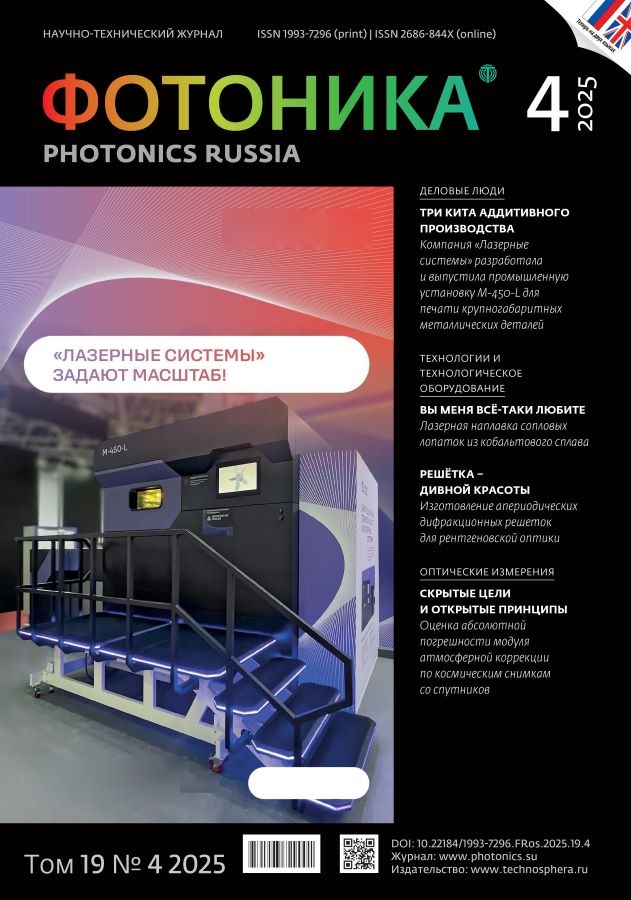Том 19, № 4 (2025)
- Год: 2025
- Статей: 9
- URL: https://journals.eco-vector.com/1993-7296/issue/view/13619
- DOI: https://doi.org/10.22184/1993-7296.FRos.2025.19.4
Деловые люди
Три кита аддитивного производства: лазеры, оптика, материалы
Аннотация
Динамика интереса индустриальных компаний, использующих в своих техпроцессах лазерные SLM-принтеры, заметно сместилась к крупногабаритным машинам. Улавливая эту тенденцию, компания «Лазерные системы» разработала и выпустила промышленную установку M-450-L для печати крупногабаритных металлических деталей с полем построения 500×500 мм с возможностью дальнейшего масштабирования.
 256-260
256-260


Конференции, выставки, семинары
Барьеры развития отрасли аддитивных технологий, поиск механизмов по их устранению. Обзор
Аннотация
В рамках деловой программы, сопровождавшей специализированную выставку «Металлообработка-2025», прошли разнообразные встречи специалистов, где обсуждались вопросы оборудования, приборов и возможностей внедрения в производство новых технологических методов обработки металлов. Конференция «Барьеры развития отрасли аддитивных технологий, поиск механизмов по их устранению» своим провокационным названием привлекла наше внимание.
 262-268
262-268


Общие вопросы отрасли. События. Документы
Проблемы привлечения внешнего финансирования высокотехнологичными инновационными стартапами в России
Аннотация
В работе проанализированы факторы, которые приводят к появлению барьеров на пути привлечения внешнего финансирования проектных работ высокотехнологичных стартапов. Среди них – поддержка доминирующей роли государства, которое выступает не только регулятором, но и основным источником финансирования. Рассмотрены причины сокращения активности субъектов, осуществляющих финансирование высокотехнологичных стартапов и инновационных проектов. Разработаны рекомендации, направленные на стимулирование внешнего финансирования высокотехнологичных проектов, что необходимо для целей инновационного развития российской экономики.
 270-278
270-278


Технологии и технологическое оборудование
Лазерная наплавка сопловых лопаток из кобальтового сплава MAR-M 509 методом лазерной газопорошковой наплавки
Аннотация
Представлены параметры режима лазерной газопорошковой наплавки для восстановления сопловых лопаток двигателя MAN TURBO из кобальтового сплава MAR-M 509 с применением отечественного порошка ЭП648. Описаны технологические меры предотвращения образования трещин при лазерной наплавке. Работы по восстановлению серии сопловых лопаток проводили на роботизированном технологическом комплексе прямого лазерного выращивания.
 282-290
282-290


Штамповая электронная нанолитография как инструмент изготовления апериодических дифракционных решеток для рентгеновской оптики
Аннотация
Представлены результаты изготовления и характеризации с использованием сканирующего атомно-силового микроскопа металлизированных апериодических дифракционных решеток (с частотой штрихов от 150 до 570 линий на мм) с использованием модернизированного штампового сканирующего электронного нанолитографа ZBA-21 с технологическим стандартом 200 нм и рабочей площадью изделия 150 × 150 мм.
 292-295
292-295


Метатроника
Влияние пористости диэлектрической частицы на положение Ми резонансов
Аннотация
Диэлектрические частицы с высоким показателем преломления демонстрируют резонансы Ми в инфракрасной области спектра, где наблюдаются характеристические полосы поглощения многих углеводородов. В статье представлено численное определение зависимости показателя преломления диэлектрической частицы, находящейся в матрице целевого вещества, от значения пористости частицы. Показано, что увеличение пористости частицы приводит к линейному уменьшению показателя преломления частицы и к линейному смещению Ми резонанса в область коротких длин волн. Дана оценка смещения спектрального диапазона проявления резонанса Ми при изменении значения пористости частицы на единицы процентов.
 296-303
296-303


Биофотоника
Исследование оптических свойств бактериохлорофилла а в составе фрагмента B800 светособирающего комплекса Rhodoblastus acidophilus при помощи нестационарных расчетов на основе теории функционала плотности
Аннотация
При помощи нестационарных расчетов на основе теории функционала плотности методами TD-DFT и TD-DFTB исследованы оптические свойства фрагмента B800 светособирающего комплекса 2 (LH2) Rhodoblastus acidophilus. Полученные в результате расчетов спектры поглощения как одиночной молекулы BChl a, так и оптимизированной структуры B800, состоящей из 9 молекул, качественно согласуются с экспериментальными данными. Доказано отсутствие значимых эффектов, обусловленных взаимодействием между соседними молекулами. Таким образом, спектральные особенности B800 не связаны со структурной организацией молекул пигментов. Показана важность нестационарных расчетов для корректного описания спектра поглощения BChl a.
 304-311
304-311


Оптические измерения
Оценка абсолютной погрешности модуля атмосферной коррекции RACE по космическим снимкам со спутников Sentinel-2
Аннотация
В статье рассмотрены два модуля атмосферной коррекции RACE (A Robust Atmospheric Correction Procedure) и Sen2Cor семейства спутников дистанционного зондирования Земли Sentinel-2 (ESA) (уровень обработки снимков L2A) и их количественное сопоставление. Модулем RACE было обработано 22 сцены Sentinel-2 уровня обработки L1C с разными условиями съемки и большим разнообразием объектов. Оценка усредненной по всем сценам абсолютной погрешности по выведенным диапазонам альбедо проводилась каждой из 22 сцен для спектральных каналов B2, B3, B4 и B8 Sentinel-2. В результате оценки абсолютной погрешности RACE для рассмотренных спектральных каналов было показано, что модуль RACE по точности определения альбедо на уровне Земли сопоставим с модулем Sen2Cor.
 312-323
312-323


Фотовольтаика
Критерий оценки полноспектральных модулей для солнечной энергетики
Аннотация
Использование высокоэффективных (КПД > 40%) полноспектральных солнечных элементов в наземной солнечной энергетике сопряжено с усложнением конструкции солнечной электростанции, что может привести к возрастанию капитальных затрат, не покрываемых увеличением энерговыработки. Предложено использовать относительный LCOE (средневзвешенная себестоимость электроэнергии, англ. – Levelised Cost of Energy) как критерий, позволяющий оценить конкурентоспособность электростанции на начальном этапе ее разработки. Показано, что конкурентоспособность электростанции с полноспектральными солнечными элементами в географической точке (51 с. ш, 108 в. д.) будет обеспечена в случае, если капитальные затраты в расчете на 1 м2 апертуры модуля не более чем в 1,9 раз превышают капитальные затраты на 1 м2 сравниваемого кремниевого модуля.
 324-332
324-332








